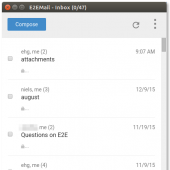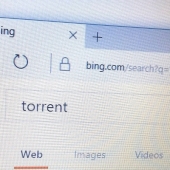-
Google Reducing Trust in Symantec Certificates Following Numerous Slip-Ups
Google Chrome engineers announced plans today to gradually remove trust in old Symantec SSL certificates and intent to reduce the accepted validity period of newly issued Symantec certificates, following repeated slip-ups on the part of Symantec.
- March 23, 2017
- 04:58 PM
 0
0
-
Bluetooth Bug Lets Burglars Disable Google Nest Cams
Burglars can use a recently disclosed security flaw affecting several Google Nest cams to make vulnerable cameras go offline for approximately 60 to 90 seconds. The flaw can be exploited via the cameras' Bluetooth connection and can provide thieves with the time window they need to get close and break into a home unseen.
- March 23, 2017
- 10:40 AM
 0
0
-
Google to Remove Chrome "Close Other Tabs" & "Close Tabs to the Right" Options
Chrome engineers are planning to remove two options from Chrome that allow users to quickly close a large number of tabs with just a few clicks.
- March 21, 2017
- 06:40 AM
 10
10
-
Google Home Devices Start Playing Ads, Forcing Many to Reconsider Their Purchase
Earlier today, several Google Home owners complained online about how their personal assistants started spewing ads out of the blue.
- March 16, 2017
- 07:13 PM
 4
4
-
Chrome 57 Limits Background Tabs Usage to 1% per CPU Core
Starting with Chrome 57, released last week, Google has put a muzzle on the amount of resources background tabs can use.
- March 14, 2017
- 03:55 PM
 0
0
-
Google Launches Invisible reCAPTCHA with No User Interaction Required
Google has launched the latest version of the reCAPTCHA service, which won't ask users to click a checkbox, as it did until now.
- March 13, 2017
- 04:52 PM
 0
0
-
Google Chrome 57 Released with WebAssembly Support, 36 Security Fixes
Version 57 of the Google Chrome for Android, Chrome OS, Linux, Mac, and Windows is available for download, or update, using the browser's built-in update feature.
- March 10, 2017
- 04:16 AM
 0
0
-
50 Google Engineers Volunteered to Patch Thousands of Java Open Source Projects
A year ago, several Google engineers got together and lay the foundation of Operation Rosehub, a project during which Google employees used some of their official work time to patch thousands of open source projects against a severe and widespread Java vulnerability.
- March 02, 2017
- 08:27 AM
 1
1
-
Tens of Thousands of Chromebooks Fail Due to Bug in Security Product
A large chunk of the 120,000 Chromebooks deployed at Maryland's Montgomery County schools went down last week after computers using Symantec BlueCoat security software weren't able to handle TLS 1.3 connections that Google started supporting with the release of Chrome and Chrome OS 56.
- February 28, 2017
- 11:15 AM
 1
1
-
Google Open-Sources Chrome Extension to Make PGP Encryption Easier in Gmail
Late Friday, last week, Google announced a new tool for security-minded users, called E2EMail, a Chrome extension that simplifies the installation of PGP encryption for Gmail.
- February 27, 2017
- 09:25 AM
 0
0
-
Google Goes Public with Unpatched Microsoft Edge and IE Vulnerability
Google has gone public with details of a second unpatched vulnerability in Microsoft products, this time in Edge and Internet Explorer, after last week they've published details about a bug in the Windows GDI (Graphics Device Interface) component.
- February 24, 2017
- 07:55 PM
 2
2
-
Google Announces First-Ever SHA1 Collision Attack
The SHA1 (Secure Hash Algorithm 1) cryptographic hash function is now officially dead and useless, after Google announced today the first ever successful collision attack.
- February 23, 2017
- 09:40 AM
 2
2
-
Google Shutting Down 'Site Search' Service, Moving Customers to CSE
Google confirmed yesterday it was shutting down its Site Search service, which is the commercial version of the free service Google Custom Search, also known as Custom Search Engine (CSE).
- February 22, 2017
- 06:23 AM
 4
4
-
Google, Bing Sign Anti-Piracy Deal That Will Demote Torrents in Search Results
Under the coordination of the UK government, rights holders and today's top two search engines have reached and signed an agreement that will demote piracy-related links in search results.
- February 21, 2017
- 05:03 AM
 0
0
-
After Microsoft Delayed Patch Tuesday, Google Discloses Windows Bug
For the second time in three months, Google engineers have disclosed a bug in the Windows OS without Microsoft having released a fix before Google's announcement.
- February 18, 2017
- 11:20 AM
 2
2
-
Chrome's Sandbox Feature Infringes on Three Patents So Google Must Now Pay $20M
After five years of litigation at various levels of the US legal system, today, following the conclusion of a jury trial, Google was ordered to pay $20 million to two developers after a jury ruled that Google had infringed on three patents when it designed some of Chrome's anti-malware features.
- February 13, 2017
- 12:45 PM
 1
1
-
Wikipedia Comments Destroyed by a Few Highly Toxic Users
A joint study carried out by researchers from Alphabet's Jigsaw and the Wikimedia Foundation has analyzed all user comments left on Wikipedia in 2015 in order to identify how and why users launch in personal attacks, one of the many faces of online abuse.
- February 12, 2017
- 07:00 AM
 2
2
-
Google Makes WordPress Site Owners Nervous Due to Confusing Security Alerts
For the past few days, Google has been making a lot of webmasters very nervous, as its Google Search Console service, formerly known as Google Webmaster, has been sending out security alerts to people it shouldn't.
- February 09, 2017
- 05:06 PM
 2
2
-
Google Will Purge the Play Store of Android Apps Without a Valid Privacy Policy
Google plans to clean up the Play Store by limiting the visibility and even removing Android apps that don't have a listed privacy policy.
- February 09, 2017
- 04:20 AM
 3
3
-
Gmail Drops Support for Windows XP and Vista Users on Chrome
Google says that starting with February 8, Chrome users will have to use version 54 or 55 (current) if they want to access their Gmail accounts.
- February 02, 2017
- 05:50 AM
 8
8
 0
0























